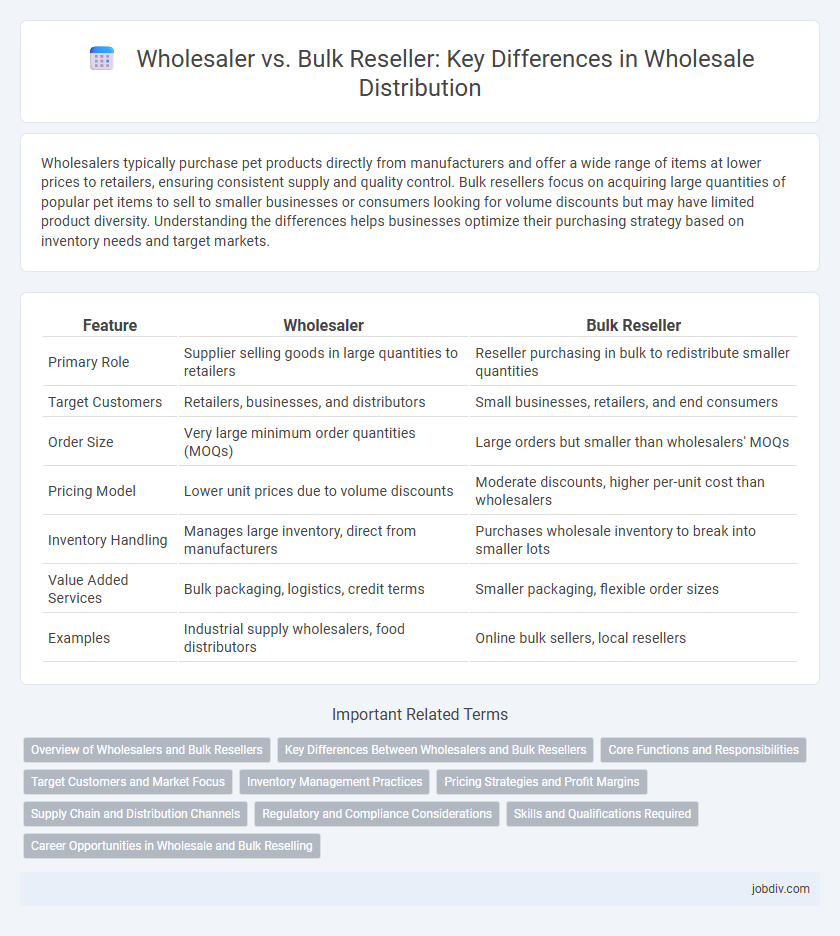Wholesalers typically purchase pet products directly from manufacturers and offer a wide range of items at lower prices to retailers, ensuring consistent supply and quality control. Bulk resellers focus on acquiring large quantities of popular pet items to sell to smaller businesses or consumers looking for volume discounts but may have limited product diversity. Understanding the differences helps businesses optimize their purchasing strategy based on inventory needs and target markets.
Table of Comparison
| Feature | Wholesaler | Bulk Reseller |
|---|---|---|
| Primary Role | Supplier selling goods in large quantities to retailers | Reseller purchasing in bulk to redistribute smaller quantities |
| Target Customers | Retailers, businesses, and distributors | Small businesses, retailers, and end consumers |
| Order Size | Very large minimum order quantities (MOQs) | Large orders but smaller than wholesalers' MOQs |
| Pricing Model | Lower unit prices due to volume discounts | Moderate discounts, higher per-unit cost than wholesalers |
| Inventory Handling | Manages large inventory, direct from manufacturers | Purchases wholesale inventory to break into smaller lots |
| Value Added Services | Bulk packaging, logistics, credit terms | Smaller packaging, flexible order sizes |
| Examples | Industrial supply wholesalers, food distributors | Online bulk sellers, local resellers |
Overview of Wholesalers and Bulk Resellers
Wholesalers purchase large quantities of products directly from manufacturers, offering goods at reduced prices to retailers and businesses for resale. Bulk resellers acquire inventory primarily in large volumes from wholesalers or distributors, focusing on redistributing these goods to smaller sellers or end consumers in bulk lots. Both play vital roles in the supply chain by facilitating product flow, but wholesalers act as the primary source for bulk resellers.
Key Differences Between Wholesalers and Bulk Resellers
Wholesalers primarily purchase goods directly from manufacturers to distribute them to retailers, while bulk resellers typically buy large quantities from wholesalers or distributors to sell smaller lots to end customers. Key differences include the target customer base, with wholesalers focusing on retail businesses and bulk resellers catering to smaller buyers or individual consumers seeking large orders. Pricing models also vary, as wholesalers offer lower prices per unit due to volume, whereas bulk resellers add markup but provide more flexible order sizes.
Core Functions and Responsibilities
Wholesalers primarily purchase large quantities of products directly from manufacturers to distribute them to retailers or other businesses, focusing on inventory management and supply chain coordination. Bulk resellers acquire products in massive volumes, often from wholesalers, to sell to end consumers or smaller retailers, emphasizing volume sales and price competitiveness. Both entities play critical roles in the distribution network, with wholesalers bridging manufacturers and retailers, while bulk resellers facilitate large-scale retail transactions.
Target Customers and Market Focus
Wholesalers primarily target retailers and businesses seeking a wide range of products at competitive prices for resale, focusing on maintaining broad inventory across various categories. Bulk resellers concentrate on customers who need large quantities of a specific product, often serving manufacturers or specialized businesses requiring volume discounts. Market focus for wholesalers spans diverse industries and product lines, while bulk resellers hone in on niche markets with high-volume demands.
Inventory Management Practices
Wholesalers typically maintain diverse inventories with multiple product lines to meet varied retailer demands, emphasizing accurate demand forecasting and replenishment scheduling. Bulk resellers focus on large quantities of fewer product types, prioritizing efficient warehouse space utilization and streamlined order fulfillment processes to minimize holding costs. Both entities leverage inventory management software to enhance stock visibility and optimize supply chain operations, but their strategies differ to align with distinct business models and customer bases.
Pricing Strategies and Profit Margins
Wholesalers typically offer tiered pricing strategies that incentivize larger orders with lower per-unit costs, allowing for moderate profit margins based on volume sales. Bulk resellers often leverage aggressive price undercutting to attract high-volume customers, focusing on quick turnover with slimmer margins but higher overall profit through scale. Understanding the difference in pricing models and margin approaches helps businesses choose the optimal partner for their supply chain needs.
Supply Chain and Distribution Channels
Wholesalers act as intermediaries in the supply chain, purchasing large quantities of goods from manufacturers and supplying them to retailers or other businesses, optimizing distribution channels by consolidating orders and managing inventory efficiently. Bulk resellers primarily focus on acquiring vast volumes of products directly from manufacturers or wholesalers to sell to end consumers or smaller businesses, often through online platforms or warehouse-style outlets. Effective coordination within supply chain logistics enables both wholesalers and bulk resellers to reduce costs and improve product availability across diverse distribution channels.
Regulatory and Compliance Considerations
Wholesalers must adhere to strict regulatory requirements, including licensing, product safety standards, and tax obligations, to ensure legal distribution channels are maintained. Bulk resellers face specific compliance challenges related to product traceability, import-export regulations, and consumer protection laws that vary by region. Both entities need robust compliance systems to mitigate risks and avoid penalties under frameworks such as FDA regulations, EPA guidelines, and international trade laws.
Skills and Qualifications Required
Wholesalers require strong negotiation skills, supply chain management expertise, and a thorough understanding of market demand to effectively source and distribute products at competitive prices. Bulk resellers must possess keen inventory management abilities, sales proficiency, and knowledge of pricing strategies to efficiently handle large volumes and maximize profit margins. Both roles benefit from analytical skills and industry-specific knowledge to optimize operations and maintain successful business relationships.
Career Opportunities in Wholesale and Bulk Reselling
Career opportunities in wholesale and bulk reselling offer dynamic roles in supply chain management, inventory control, and sales strategy development. Wholesalers typically engage in large-scale distribution networks, creating demand for expertise in logistics and client relationship management, while bulk resellers focus on market analysis and resale pricing strategies to maximize profit margins. Both pathways provide growth potential in business development, procurement, and operations management within the wholesale industry.
Wholesaler vs Bulk Reseller Infographic

 jobdiv.com
jobdiv.com